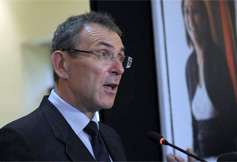Commission pledges €110 million to complete safety work on Chernobyl site

On Tuesday (19/04), 25 years after the tragic Chernobyl accident, President Barroso and Commissioner Piebalgs announced the European Commission's pledge of €110 million at a high-level conference in Kiev to ensure that the Chernobyl site is made stable and environmentally safe. The Commission has so far committed a lion's share - some €470 million - to Chernobyl-related projects, mainly for nuclear safety, but also on programmes to help the local population and provide affected families with access to quality healthcare. Yet a further €740 million are needed from the international community in order to complete the major projects on the site by 2015.
What will the new pledge be used for?
The new pledge will be used mainly to complete the New Safe Confinement – a giant arch structure which will cover the damaged Chernobyl unit 4, to isolate it and to allow its deconstruction in the future. The scale of the structure is unprecedented and, once built, the arch will be long enough to cover almost two football pitches and high enough to house the Statue of Liberty. The pledge will also help to complete the construction of the Spent Fuel Storage Facility, which, once built, will store the spent fuel from the units which remained in operation after the accident, which is required for the decommissioning of the plant.
EU support to make the Chernobyl site safer
In the wake of the Chernobyl accident, the European Commission has been working to improve nuclear safety and to deal with legacy of the disaster. Key achievements in the Commission's work so far (largely through the Chernobyl Shelter Fund and the Nuclear Safety Account international funds) have been the stabilisation of the existing shelter, the implementation of infrastructure which meets international health regulations and provides the best possible protection for on-site workers and the construction of facilities in view of future decommissioning.
In addition to contributions to the international funds managed by the EBRD (the Chernobyl Shelter Fund and the Nuclear Safety Account) the Commission has funded projects to study, assess and mitigate the consequences of the accident. It has also provided its own contribution to the radioactive waste management projects needed for the restoration of the site. Crucially, the actions already implemented have created the conditions that have made the start of the construction of the New Safe Confinement possible.
In addition to securing the environment, the Commission has carried out social projects in areas such as healthcare, education and horticulture to help those suffering the effects of the accident to rebuild their lives. The Children of Chernobyl projects have been set up to help mothers and children who were contaminated by the catastrophe by providing access to quality healthcare for all newborns in the area, as well as giving parents access to a "better parenting" course. The project has also provided equipment to hospitals (infant resuscitation set, ventilation set, infant incubator, phototherapy lamp), set up classes in nutrition for vulnerable families in the region and installed open-air playgrounds for young children.
The Commission has also supported a rehabilitation programme to develop economic opportunities in the agricultural sector and set up private businesses, helping to create new jobs and provide taxes for the area. For example, 70 families in the region were given on-the-ground training on how to grow fruit and berries and all the equipment needed. Since then, the participants have already achieved some success – selling their first strawberries and apples - helping to revitalise the region and encourage others to set up their own businesses.
More information:
For information on the Commission's work on Chernobyl and Nuclear Safety:















